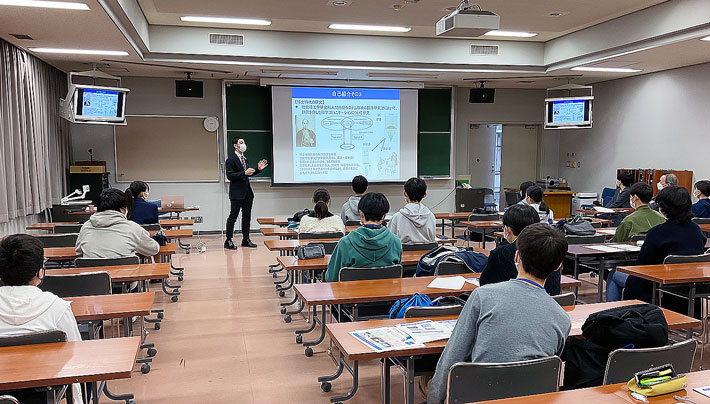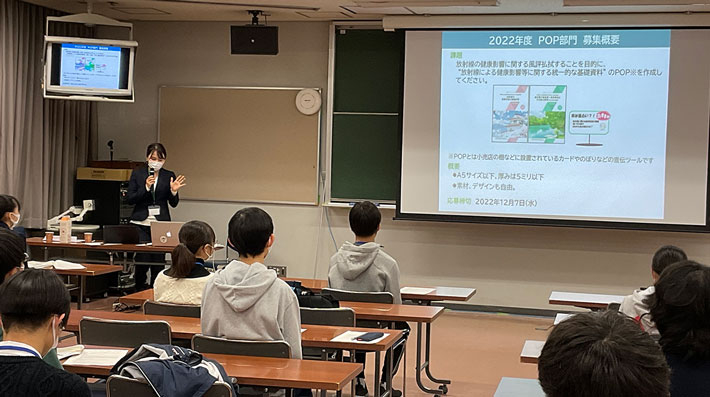Tokyo Tech High School of Science and Technology hosted Radiation College, a seminar that aims to disseminate accurate scientific knowledge about the health-related effects of radiation, on October 27. Twenty-two first and second-year high school students participated in the event, which featured a lecture by a Tokyo Tech alumnus and another by a government official from the Ministry of the Environment.
Radiation College is a series of seminars conducted under the auspices of the Ministry of the Environment's Guguru Project. Guguru is an abbreviation of the suffixes of the Japanese verbs tsumugu, tsunagu, tsutawaru, which roughly translate to "weave, connect, and share." The government project aims to weave together learning and knowledge, connect people, cities, and organizations, and share information and stories as if they were one's own.
While this government project was initially aimed at university and technical college students, Tokyo Tech High School of Science and Technology was the first high school in Japan to host the event in 2021, expanding the scope of participants to high school students.
Radiation College aims to explore aspects of radiation-related health effects through five approaches — "To know", "To learn", "To make decisions", "To listen", and "To research." The 2022 session at Tokyo Tech High School of Science and Technology was a combination of the first two of these approaches — "To know" and "To learn."
Lecture 1: "To know" — Deciphering academic papers through a scientific approach
Assistant Professor Isamu Amir
School of Medicine, Fukushima Medical University
Assistant Professor Isamu Amir, who also gave a lecture at this event in 2021, returned in 2022 to share his knowledge with the high school students. Amir, who is a graduate of Tokyo Tech, worked as a lecturer of chemistry at the Tokyo Tech High School of Science and Technology during his doctoral program days at the Institute. During his lecture, titled "Considering the reliability of information," Amir stressed the importance of scrutinizing information, pausing for a moment to view issues from multiple perspectives, and not taking things at face value. He demonstrated his points using various examples, including scientific papers and counterarguments, to enhance understanding among the students. He also touched on the difference between causation and correlation, contrasted books and online articles, and encouraged students to think more deeply about why misinformation arises, and what the resulting damage may be.
The lecture was given in an interactive environment, encouraging the young audience to ask questions openly using online tools made available for the talk.

Lecture by Asst. Prof. Amir
Lecture 2: "To learn" — Radiation College
Yuko Matsumura
Radiation Health Management Office, Environmental Health Department, Minister's Secretariat, Ministry of the Environment
During her lecture, Yuko Matsumura from the Ministry of the Environment introduced the concept of the Guguru Project, and explained the future direction of Radiation College.

Lecture by Dr. Matsumura
Q&A session
The students submitted plenty of questions to the lecturers, which included the following:
Question:
If we think of countries that control information dissemination, I don't necessarily feel that information released by such governments is reliable as it is influenced by government intentions. Considering this perspective, what do you consider to be reliable information?
Answer:
In order to assure yourself of the reliability of information, acquiring information from multiple sources such as articles from various newspapers is of primary importance.
Question:
Is it true that there are many ways in which radiation, a single form of energy, can have negative effects on the human body?
Answer:
We are all constantly exposed to radiation in our daily lives. Radiation is a strong wave of energy, and therefore the cells in our bodies are more or less damaged by radiation exposure. However, the cells in our bodies also have the ability to repair these damaged parts. When this repair function does not work properly, negative effects may occur.
Question:
There is so much I do not know at the moment. What can I do to learn about things that I don't even know exist yet?
Answer:
Rather than attempting to answer this challenging question alone, Assistant Professor Amir asked all the participants to share their thoughts and perspectives on ways to expand one's knowledge.






